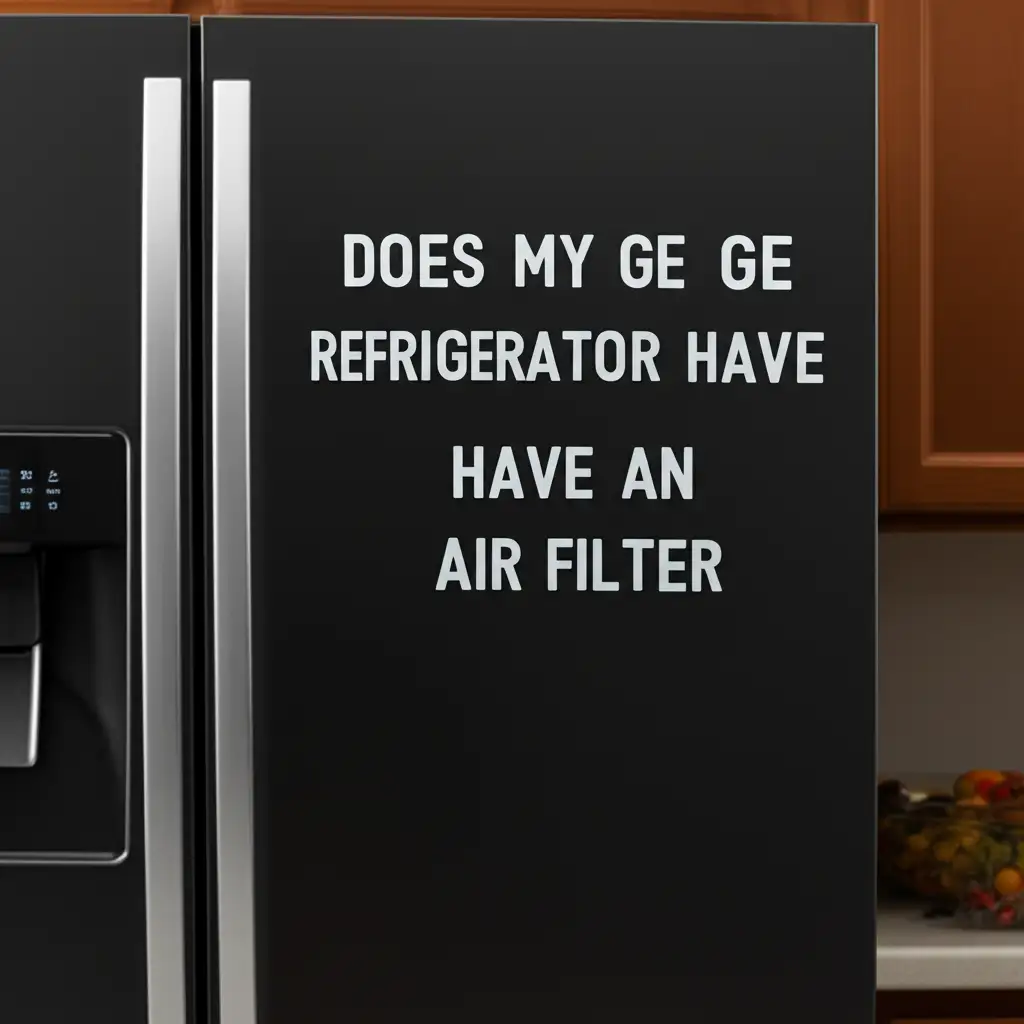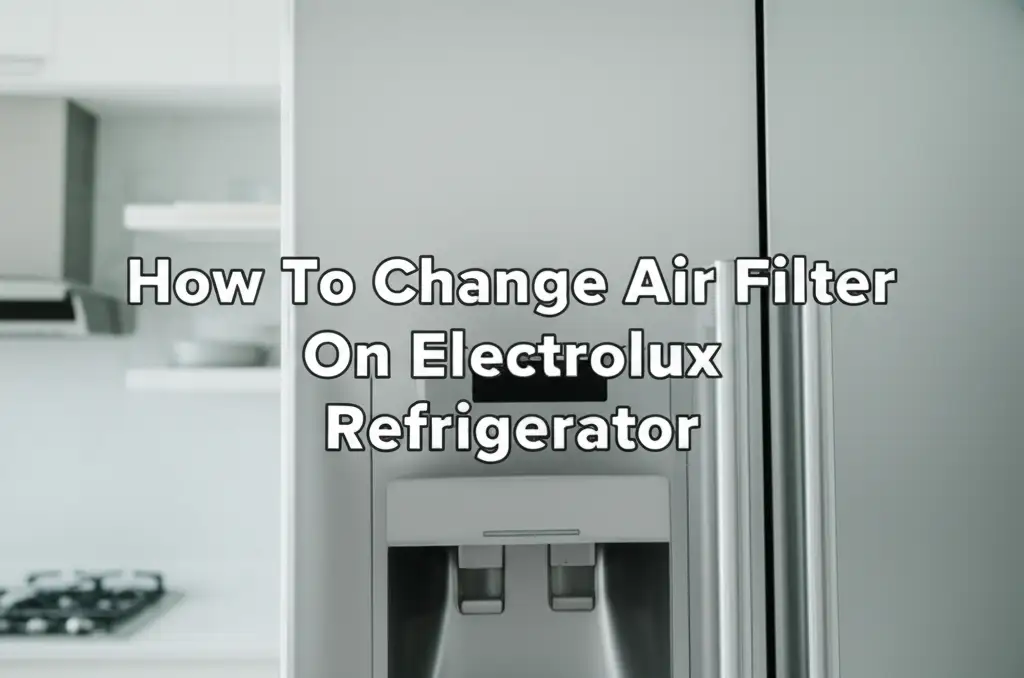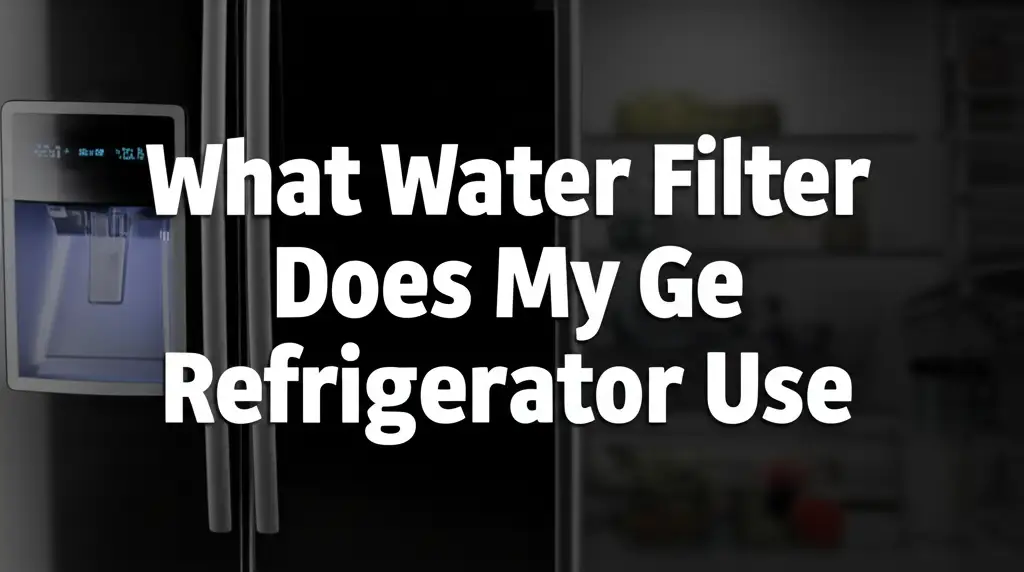· Todd Martin · Refrigerator Maintenance · 12 min read
Does My Ge Refrigerator Have An Air Filter

Unveiling Your GE Refrigerator’s Air Filter: A Fresh Air Guide
Have you ever opened your refrigerator door and noticed a mix of lingering food smells? Perhaps you wonder if your GE appliance offers a solution. Many modern GE refrigerators do include an air filter designed to keep your food smelling and tasting fresh. This small but mighty component plays a significant role in maintaining optimal internal air quality.
Understanding whether your specific GE model has an air filter, and how to maintain it, is essential for preserving food freshness. I will guide you through identifying its presence, understanding its purpose, and the simple steps for replacement. This article will help you ensure your GE refrigerator provides the best environment for your groceries. We will cover filter types, their benefits, and how to keep your fridge smelling clean.
Takeaway:
- Many GE refrigerators, especially newer and higher-end models, feature an internal air filter.
- These filters use activated carbon to absorb odors and sometimes ethylene gas to extend produce life.
- Locate the filter, often near the top shelf or crisper, and replace it every six months.
- Check your owner’s manual for specific filter type and replacement instructions for your GE model.
Does my GE refrigerator have an air filter? Yes, many modern GE refrigerators, particularly Profile and Café series models, come equipped with an internal air filter. This filter actively works to absorb odors and sometimes harmful gases, ensuring your stored food stays fresher for longer and your fridge maintains a pleasant smell.
Do All GE Refrigerators Have Air Filters? Understanding GE’s Freshness Systems
It’s common to wonder if every GE refrigerator comes with an air filter. The simple answer is no, not all GE refrigerators feature an internal air filter. Older or more basic models often do not include this component. However, many newer and higher-end GE refrigerators, especially those in the GE Profile, GE Café, and some GE Energy Star series, are equipped with advanced air filtration systems.
These advanced systems are a key selling point for maintaining optimal food storage conditions. GE has invested in technologies like their “ARP” (Advanced Refrigeration Purification) filter to enhance food preservation. This filter is specifically designed to tackle common refrigerator challenges like lingering odors. It provides a cleaner environment inside your appliance. When you consider a new appliance, looking for this feature is important. Just like some other brands, GE prioritizes internal air quality in its premium models. For example, some homeowners also ask, Does My KitchenAid Refrigerator Have An Air Filter? The presence of these filters varies by brand and model line. Always check your specific model’s features or owner’s manual to confirm if it includes an air filter.
The Importance of Air Filtration in Your Refrigerator
An air filter inside your GE refrigerator offers significant benefits for both your food and your kitchen. Its primary role is to maintain a clean, fresh-smelling environment. Without proper air circulation and filtration, odors from various foods can mix, leading to an unpleasant smell when you open the door. This can also affect the taste of other foods. I’ve experienced this firsthand when strong-smelling foods transfer their aroma.
Beyond just odors, some advanced air filters also tackle ethylene gas. Ethylene is a natural gas produced by certain fruits and vegetables, like apples and bananas, as they ripen. This gas can accelerate the ripening and spoilage of other produce stored nearby. An air filter with ethylene absorption capabilities helps to slow down this process. It keeps your fruits and vegetables fresh for a longer period. This feature is particularly valuable if you frequently store a variety of produce in your fridge. It ensures you get the most out of your groceries. Just like GE, other appliance manufacturers understand this need, and you might find yourself asking, for instance, Does My Maytag Refrigerator Have An Air Filter? The concept of air purification in refrigerators is a growing trend across the industry, highlighting its importance for food preservation and overall fridge hygiene.
Locating the Air Filter in Your GE Refrigerator Model
Finding the air filter in your GE refrigerator is usually a straightforward process. The exact location can vary depending on your specific model. Most commonly, GE places their air filters in easily accessible areas within the fresh food compartment. You might find it near the top shelf, mounted on the back wall, or even integrated into the ceiling of the refrigerator.
Some models may have the filter compartment located near the crisper drawers. It usually has a small, louvered cover that indicates its presence. I recommend checking your owner’s manual first. The manual provides precise diagrams and instructions for your particular GE refrigerator model. It will clearly show you where the air filter is located and how to access it. If you cannot find your physical manual, GE’s official website offers digital versions by entering your model number. Knowing the exact location ensures you can replace it correctly when needed. This is similar to how you would find and replace a water filter, for instance, when learning How to Replace GE Side-by-Side Refrigerator Water Filter; the owner’s manual is always your best guide for any maintenance task on your appliance.
GE’s Advanced Filtration Technologies: What to Know About ARP and Fresh Food Filters
GE employs different names for its refrigerator air filtration technologies, with “ARP” (Advanced Refrigeration Purification) being one of the most prominent. The ARP filter is a key component in many GE Profile and Café series refrigerators. It uses a blend of activated carbon and other materials to purify the air inside your fridge. Activated carbon is excellent at trapping microscopic odor particles. This ensures that unpleasant smells from foods like onions or leftover curry do not linger or transfer to other items.
In addition to odor removal, some GE air filters, particularly those designed for produce preservation, incorporate ethylene gas absorption capabilities. These filters contain materials like potassium permanganate or zeolite, which react with and neutralize ethylene gas. This chemical process significantly slows down the ripening process of fruits and vegetables that are sensitive to ethylene. It also stops its spread to other produce. This extends the shelf life of your fresh produce. Understanding these technologies helps you appreciate the advanced features built into your GE appliance. For example, while you cannot typically clean GE air filters, some brands might offer that option, leading to questions like Can You Clean an LG Refrigerator Air Filter? GE’s filters are generally designed for simple replacement rather than cleaning, ensuring consistent performance.
Step-by-Step Guide: Replacing Your GE Refrigerator Air Filter
Replacing the air filter in your GE refrigerator is a simple task that takes only a few minutes. GE recommends changing the air filter approximately every six months. Your refrigerator often has an indicator light that will illuminate when it’s time for a replacement. Paying attention to this light is crucial for maintaining optimal air quality.
Here’s a general guide for replacement:
- Locate the Filter: Open your refrigerator door and find the air filter compartment. As discussed, this is usually near the top shelf or at the back. It might be a small square or rectangular casing.
- Open the Compartment: Most GE air filter compartments have a tab or a latch that you press or pull to open. Some may require a slight twist.
- Remove the Old Filter: Carefully slide out the used filter cartridge. It might look a bit dusty or discolored, which is normal as it has been absorbing impurities.
- Insert the New Filter: Unwrap your new genuine GE air filter. Make sure you align it correctly with the arrows or guides in the compartment. Slide it firmly into place until it clicks or locks.
- Close the Compartment: Securely close the filter compartment door or cover.
- Reset the Filter Indicator Light: This is an important step. Most GE refrigerators have a “Reset Filter” button on the dispenser panel or inside the fresh food compartment, often near the filter itself. Press and hold this button for 3-5 seconds until the light turns off or changes color. Refer to your owner’s manual for the exact button and procedure for your model.
Using genuine GE replacement filters is always recommended. They are designed to fit perfectly and provide the filtration GE intended. Regular replacement ensures your fridge consistently removes odors and keeps your food fresh. This regular maintenance is similar to knowing How Long Does GE Refrigerator Water Filter Last and replacing it on schedule; both are vital for your appliance’s health and performance.
Maintaining Optimal Air Quality: Beyond Just the Filter
While your GE refrigerator’s air filter is excellent at removing odors and ethylene gas, it is part of a larger strategy for maintaining fresh food and a clean-smelling fridge. An air filter works best when complemented by good storage habits. These habits significantly impact the overall air quality and longevity of your food. I always make sure to follow these best practices for my own appliance.
Here are additional steps you can take:
- Proper Food Storage: Always store strong-smelling foods, like onions, garlic, or certain cheeses, in airtight containers. This prevents their odors from permeating the entire refrigerator compartment. Using containers also helps to keep food from drying out and protects it from cross-contamination.
- Regular Cleaning: Spills and forgotten food items can create lingering odors. Wipe up spills immediately and conduct a thorough cleaning of your refrigerator interior every few months. This includes wiping down shelves, drawers, and walls with a mild soap and water solution. A clean interior gives the air filter less work to do.
- Discard Expired Items: Regularly check expiration dates and remove any spoiled or expired food. Decomposing food is a primary source of bad odors. Taking out old items keeps your fridge hygienic.
- Baking Soda or Activated Charcoal (if no filter): If your GE refrigerator does not have an air filter, or as an extra measure, placing an open box of baking soda or a container of activated charcoal can help absorb odors. These natural absorbents are effective at neutralizing smells over time. Remember to replace them every three months or so.
- Ensure Proper Air Circulation: Avoid overpacking your refrigerator. Leave some space between items to allow cold air to circulate freely. Proper airflow helps the air filter work more efficiently. It also ensures consistent temperatures throughout the fridge, which is important. For example, if you overpack, you might find that your food starts freezing, leading to a query like Why Does My GE Refrigerator Keep Freezing My Food? Maintaining good air circulation prevents such issues and helps both your filter and the cooling system perform optimally.
By combining these simple practices with your GE refrigerator’s air filter, you ensure a continuously fresh and hygienic environment for all your food items.
Common Questions and Troubleshooting Your GE Refrigerator Air Filter
Even with a dedicated air filter, you might encounter some questions or minor issues. It is helpful to understand common scenarios. Many people have similar concerns about their filters. I will share some common questions people ask.
1. My filter light won’t reset after I replaced the filter. This is a common issue. After installing a new air filter, you must manually reset the indicator light. The “Reset Filter” button is usually located on the dispenser panel or inside the fresh food compartment. Press and hold it for three to five seconds until the light turns off. If it still doesn’t reset, consult your owner’s manual for specific instructions for your model.
2. I still smell odors even after replacing the air filter. An air filter primarily tackles airborne odors. If you have persistent smells, check for spills or spoiled food. Ensure all strong-smelling items are in airtight containers. A deep cleaning of the refrigerator interior might be necessary. Also, ensure you are using a genuine GE replacement filter; off-brand filters might not perform as well.
3. What if my GE refrigerator model doesn’t have an air filter? Many older or basic GE models do not include an air filter. You can still maintain freshness using natural odor absorbers. An open box of baking soda or a bowl of activated charcoal placed in the fridge will effectively absorb odors. Remember to replace these every 1-3 months.
4. How often should I change my GE refrigerator air filter? GE generally recommends replacing the air filter every six months. Your refrigerator’s filter indicator light will also signal when it’s time for a replacement. Consistent replacement ensures optimal odor and ethylene gas absorption.
5. Is the air filter the same as the water filter in my GE refrigerator? No, the air filter and water filter are distinct components with different functions. The air filter cleans the air inside the fresh food compartment. The water filter purifies the water dispensed from your fridge and used for ice making. They are located in different parts of the refrigerator. Understanding their separate roles is important for proper maintenance. You can run your GE refrigerator without a water filter, but it will not provide filtered water; for example, Can You Run GE Refrigerator Without Water Filter discusses this. Similarly, if you choose not to replace your air filter, your fridge will still function, but odors may become an issue.
6. Where can I buy a replacement GE air filter? You can purchase genuine GE replacement air filters directly from the GE Appliances website. They are also available from authorized GE parts dealers, major appliance retailers, and online marketplaces like Amazon. Ensure you buy the correct filter model number for your specific GE refrigerator.
Conclusion
Understanding if your GE refrigerator has an air filter, and how to properly maintain it, is crucial for keeping your food fresh and your appliance odor-free. Many modern GE models, especially the higher-end series, come equipped with advanced air filtration systems designed to combat odors and extend the shelf life of your produce. These filters work tirelessly to maintain a clean internal environment.
Taking a few moments to locate your filter, typically near the top shelf or crisper, and replacing it every six months is a simple yet impactful maintenance task. Always refer to your GE refrigerator’s owner’s manual for precise instructions tailored to your specific model. By regularly replacing your GE refrigerator air filter and practicing good food storage habits, you ensure your appliance continues to provide the best possible conditions for your groceries. Make it a routine to check your filter indicator light and enjoy a consistently fresh-smelling refrigerator.
- GE refrigerator
- air filter
- fresh food





